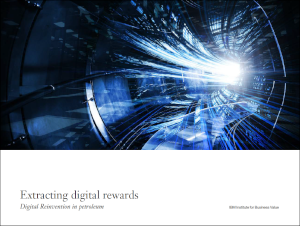Ungated Post | 01 Oct 2018
Extracting digital rewards: Digital Reinvention in petroleum

Petroleum markets must shift from an era of “organizational centricity,” in which companies and service providers largely defined what to produce and market to customers, to one of “individual centricity,” in which tech-savvy consumers demand customized engagement and experiences.
Today’s global petroleum industry is best understood within what we call the everyone-to-everyone (E2E) economy. The E2E orchestrated, based on business ecosystems that are both collaborative and seamless; it is contextual, in that customer and partner experiences are calibrated and relevant to their specific actions and needs; it is symbiotic, in that everyone and everything, including customers and businesses, are mutually interdependent; and it is cognitive, characterized by data-enabled, self-supported learning and predictive capabilities.
In cooperation with the IBM Institute for Business Value, we surveyed 600 global executives in the chemicals and petroleum industries. Responding executive roles included COOs and CIOs, and their direct reports. In total, 300 petroleum respondents participated in the study – 26% from North America, 5% from South America, 33% from Europe, 11% from the Middle East and Africa, and 25% from Asia Pacific.
Our Thought Leadership team produces original, evidence-based research made accessible to decision-makers and opinion leaders.
Oxford Economics’ team is expert at applying advanced economic tools that provide valuable insights into today’s most pressing business, financial, and policy issues.
Related Services

Post
KPMG M&A Outlook 2026: Between Uncertainty, Resilience, and Seizing Opportunities
Discover how Germany’s M&A landscape is evolving – with a focus on growth, AI and post-merger value creation.
Find Out More
Post
Silver, the next generation metal
This report highlights the critical role silver plays in data centres and artificial intelligence (AI), automotive and electric vehicles (EVs), and solar energy photovoltaics (PVs). With these sectors expected to expand significantly over the coming years, we expect future silver demand to be strong.
Find Out More
Post
Powering the UK Data Boom: The Nuclear Solution to the UK’s Data Centre Energy Crunch
The UK’s data centre sector is expanding rapidly as digitalisation, cloud computing, and artificial intelligence (AI) drive surging demand for high-performance computing infrastructure.
Find Out More